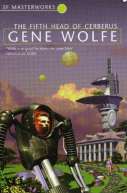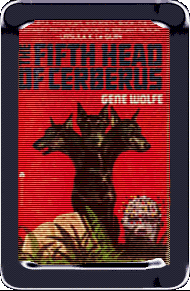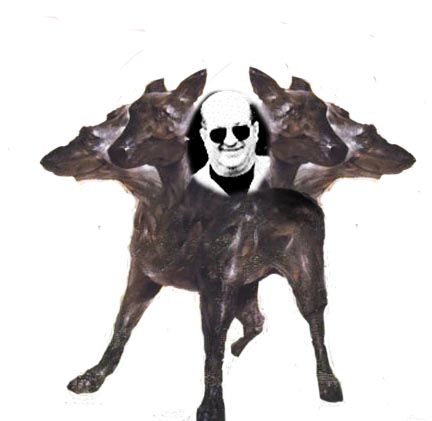If you do not find all you seek within these humble pages, please look at these other sites!
ultan's Library- Online Gene Wolfe Literary Journal
Cave Canem- Robert Borski's Authoritative Website
SFBookcase- More Information on the Wolfe


And the owlet whoops to the wolf below,
That eats the she-wolf's young
Samuel Taylor Coleridge-- The Rime of the Ancient Mariner
"The Fifth Head of Cerberus" is the first novella in the collection. Told in first person, it is a series of reflection's on the nameless narrators childhood. Essentially it is a coming of age tale, albeit a particularly gothic one. The narrator tells of his privledged upbringing as the son of Maitre, a mysterious scientist who runs a brothel to support his experiments in the once powerful colonial city Port-Mimizon on St. Croix. The narrator, whom Maitre calls Number Five, and his brother David are tutored by their father's robot, Mr. Million, in the quadrivium. Slowly and beautifully, the narrator reveals how he is coddled by his father to assume his position in the house and in the science experiements because they, father and son, are in fact the same person; genetically identical clones of the man who's mind is inside of Mr. Million.
If it sounds confusing that's because it is. If John Clute says it's hard to read you better believe it. But like all of Wolfe's fiction, the difficultly is part of the enjoyment and, in my humble opinion, "Cerberus" is definitely worth the effort. From a literary viewpoint, the world of St. Croix and St. Anne and the mysteries that lie therein borrow directly from Borges, Nabakov, and Proust. It is the examination fo these mysteries that makes "Fifth Head" so enjoyable. Not like a murder mystery but a religious mystery that can be understood and at the same time, have the knowledge of it's total comprehension veiled.
One such chthonic riddle is that of the narrator's, and thus Maitre and Mr. Million's, true name. Because, even though Wolfe does not give the name outright it can be deduced from the text. The famous literary critic, John Clute, was perhaps the first to hypothesize on this idea in his essay collection:Strokes. Online, Robert Borski has put the general line of reasoning down on his website here. But even with the narrators true name in mind, the reader will not come to any final understanding of the collection. Knowledge only leads you further into the Garden of Forking Paths, without an end in sight.
What is most important about"Fifth Head" is that it sets the stakes for the other two novellas. Not only are the mysteries alluded to again but a periphrial character, John V. Marsch, is introduced in the novella as the man who origionally wonders if Number Five is a clone. Later in "V.R.T.", it is his own identity that will be explored.

